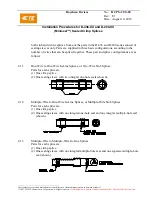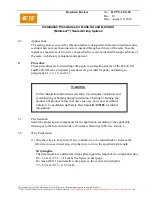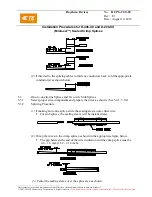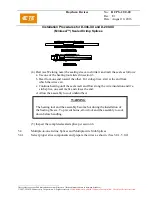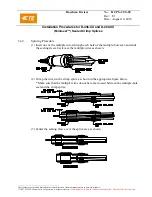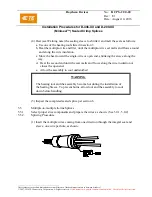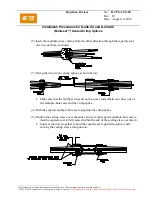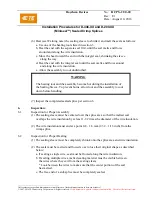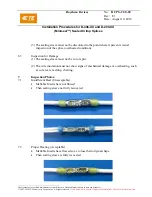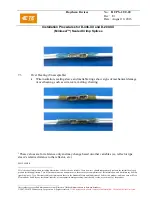
Raychem Devices
No: RCPS-200-20
Rev: E1
Date: August 10, 2016
Installation Procedures for D-436-XX and D-200-XX
(Miniseal™) Sealed Crimp Splices
_________________________________________
Unless otherwise specified dimensions are in millimeters. [Inches dimensions are in between brackets]
© 2007-2016 TE Connectivity Corporation. All rights reserved.
If this document is printed it becomes uncontrolled. Check for the latest revision.
(6) Heat (see Warning note) the sealing sleeve to shrink it and melt the seals as follows:
a. Use one of the heating tools listed in section 3.
b. Heat the end with the separate seal first, until the seal melts and flows
around and along the wire insulation.
c. Move the heat toward the end with the integral seal, shrinking the sleeve
along the way.
d. Heat the end with the integral seal until the seal melts and flows around
and along the wire insulation.
e. Allow the assembly to cool undisturbed.
WARNING
The heating tool and the assembly become hot during the installation of
the Sealing Sleeve. To prevent burns, allow tool and the assembly to cool
down before handling.
(7) Inspect the completed sealed splice per section 6.
6.
Inspection:
6.1
Inspection for Proper Assembly
(1) The sealing sleeve must be centered over the splice area so that the melted seal
overlaps the wire insulation by at least 1-1/2 times the diameter of the wire insulation.
(2) The wire insulation must end at a point 0.8 - 1.6 mm (1/32
–
1/16 inch) from the
crimp splice.
6.2
Inspection for Proper Heating
(1) The sealing sleeve must be completely shrunk onto the splice area and wire insulation.
(2) The seals must be melted and flowed so as to lose their original shape as described
below:
a. If sealing a single wire, seal must be flowed along the wire insulation.
b. If sealing multiple wires, melted sealing material must be visible between
the wires where they exit from the sealing sleeve.
* Look between the wires to make sure that the center portion of the seal
has melted.
c. The free end of a stub splice must be completely sealed.


